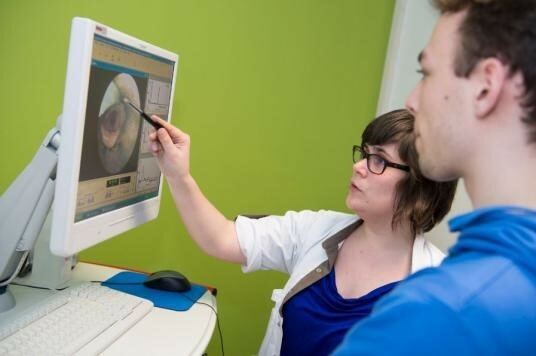Swallowing disorders
Symptoms and causes
Symptoms and causes
If you have difficulty swallowing, you can contact our swallowing lab. This is part of dysf², a specialised centre for swallowing problems (dysphagia) and voice problems (dysphonia). It is a collaboration between voice and swallowing specialists from the Ear, Nose and Throat Department and the Speech Therapy Department to provide help to people with voice and/or swallowing problems from different disciplines. Both adults and children can go there to treat their swallowing problems.
Characteristics
Some examples of swallow difficulties include:
- When I eat my sandwich, I cannot swallow it anymore.
- I choke a lot more than before.
- I need to cough while eating and/or drinking.
- I take twice as long to eat my meals as I used to.
- Food gets stuck in my throat.
Causes
Some examples of causes include:
- Zenker's diverticulum: the swallowing symptoms can be accompanied by:
- food coming back up
- bad breath
- lump in throat feeling
- nocturnal coughing, this can be visualised with a contrast swallow video and/or a CT scan of the neck
- after surgery or radiation
- obstructive injuries (cysts, tumours, and, in rare cases, throat cancer)
- various other conditions of the oesophagus
- neuromuscular conditions
Diagnosis and treatment
Diagnosis and treatmentDiagnosis
We examine together with you, using a swallow test, to what extent the way in which you swallow causes or facilitates your problem (logopaedic). We also look to see whether there is an anatomical reason for your symptoms (medical). We have the necessary specialised equipment and experience to properly identify swallowing problems.
Do you have problems with specific drinks or food or do you experience problems with certain glasses or cups? Bring these with you to the examination so that the underlying reasons can be investigated.
Treatment
It is our intention that you will know what the treatment options are after the first examination. We will also give you further information about a possible reimbursement of the voice therapy and provide the reimbursement paperwork.
If you wish, we will send a report of your examination to your GP and we will provide the report to you and/or another attending physician on request.
In our hospital, you can see specialised swallowing therapists for speech therapy. We are also happy to help you find a specialised colleague closer to home for the necessary follow-up. In addition, we are pleased to work with other disciplines (e.g. dietitian, occupational therapist, physiotherapist, osteopath) inside or outside of the hospital if that is beneficial for you.
Are you a speech therapist who does not have the necessary diagnostic equipment? In that case, you may refer patients to our hospital for the necessary testing.
For questions or an appointment, please contact the swallowing lab at +32 9 246 99 94. If you are not able to keep your appointment, you can always call the general number for speech therapy (+32 (0)9 246 99 90).
If you would like to make an appointment with the Ear, Nose, Throat diseases department, please contact +32 (0)9 246 83 00.
Treatment centres and specialisations
Treatment centres and specialisations
Latest publication date: 15/05/2024
Supervising author: Dr Vermeiren Judith




